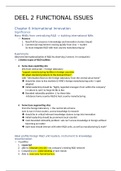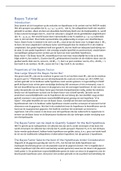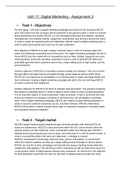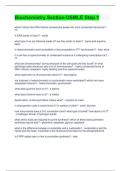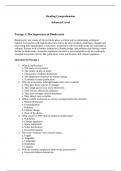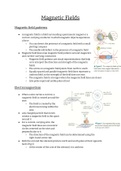STA 211 – PROBABILITY II
Lecture Note by DANIEL Deborah O.
COURSE OUTLINE
Probability - Discrete Sample Spaces, Definitions and Rules of Probability, Combinatorial
Analysis, Conditional Probability, Independence, and Bayes’ Theorem;
Mean and Variance of Some Discrete Probability Distribution – Bernoulli Distribution; Binomial
Distributions, Poisson Distributions; Discrete Uniform Distribution, Geometric Distribution;
Hyper-Geometric Distribution;
Application Of Some Discrete Probability Distribution - Binomial Distribution, Poisson
Distribution, Negative Binomial Distribution, Geometric Distribution, Hyper-Geometric
Distribution, Multinomial Distribution;
Mean and Variance of Some Continuous Probability Distribution – Uniform or Rectangular
Distribution, Exponential Distribution;
, PROBABILITY
Definition of basic concepts
Sample Space: it is the collection of all possible outcomes of an experiment. For example, in
a single throw of a fair die, the sample space is S ={1,2,3,4,5,6}
Event: An event is a collection of outcomes. For instance in the experiment involving a single
throw of a die, the event that an even number turns up is E ={2,4,6}
Probability: Probability is a quantitative measure of the chances or likelihood or expectation
of the occurrence of an event. The values are between 0 and 1. An event that is certain to
occur has probability 1while the event that is certain not to occur has probability 0
Null Event: This is an event that does not contain any outcome, i.e. the outcome is an empty
set, e. g., in two throws of a die, the event that the sum of the numbers that turn up will be 15
is a null event. The probability of a null event is zero.
Independent Events: Two events, A and B are independent when the occurrence or non-
occurrence of one does not affect the occurrence or non-occurrence of the other. For example,
in two throws of a die, the outcome of the first throw does not affect the outcome of the second
throw. The joint probability of the two independent events is the product of their individual
probabilities, i.e.
Mutually Exclusive Events: Two events A and B are mutually exclusive when the occurrence
of one prevents the occurrence of the other, in other words, the two events don’t have any
outcomes in common, and their intersection is a null or an empty set. For instance, in a single
toss of a coin, the event that
“head” turns up, say A, A ={H}and the event that “tail” turns up, say B, B {T } , 𝐴 and 𝐵
are mutually exclusive events.
Classical Definition of Probability
Let S be the sample space containing all the n S( ) possible equally likely outcomes of an
experiment and let E be an event consisting of a set of n E( ) such outcomes; then the
probability of event E is defined as
n( E )
P( E )
n( S )
Laws of Probability
There are two major laws of probability; the multiplication law and the addition law

